- Home
- Jacob Peppers
Defiant Guardians Anthology Page 7
Defiant Guardians Anthology Read online
Page 7
A man lay in the bed asleep. He was dressed in silk night clothes and a black mask covered his eyes. He was older than Aaron had expected, his shoulder length silver hair tied in a tail. He was thin too, only just past the point of emaciation. Aaron watched him as he closed the door, not bothering to ease it shut.
The man stirred at the sound but did not remove the mask he wore, “Not now, Gregory, please,” he said, a slight smile on his face, “I’m very tired, and the congregation will be here in a few hours. Later though … well … we’ll see.”
Instead of answering, Aaron shuffled to the desk, grabbing the wooden chair behind it and dragging it toward the side of the bed. The chair scraped against the hardwood floor, and the man in the bed frowned as Aaron pulled it up beside the bed and eased his way into it, wincing as his wounded rib complained at the movement.
“Really, Gregory,” the man said, pulling the mask off with one hand, “I thought I was clear abou—“ he paused as he saw Aaron sitting there, his wide eyes noting the sword in his hand. “You’re not Gregory.”
“No.”
“Gregory,” the man said, louder. “Gregory!”
“You’ll have to talk quite a bit louder than that if you want him to hear you, I’m afraid. Even still, I wouldn’t expect an answer anytime soon.”
The man looked at Aaron, at the blood covering his clothes and hands, and his eyes widened, his expression turning incredulous as he sat up in bed. “What have you done, fool? Who would dare to bring violence into the house of the gods? A curse will be brought on your life, a damnation that will follow you for all of your short miserable days.”
Aaron thought of his parents, murdered when he was a child, thought of the orphanage in which he’d grown up, in which he’d been beaten and tortured. “You’ll have to excuse me if I’m not impressed, father, but I’ve been cursed since the day of my birth, and a man can only be damned once. Or should I call you Grinner?”
The incredulous expression of fear and outrage vanished from the man’s face in an instant, and he met Aaron’s gaze with cold, calculating eyes. “I don’t know who you are, but if you’ve hurt Gregory….”
“Not hurt. Killed. I thought I’d made that clear. And my name’s Aaron. Aaron Envelar.”
Tightly-controlled fury blazed in the man’s eyes, but when he spoke, his voice was calm, “Envelar … I know that name. Ah, yes. The one they call the “Silent Blade.” I don’t know what business has brought you here,” he said, speaking with the authority of a king to his servants instead of a man caught unawares in his bed, still dressed in his night clothes, “But you should not have hurt him. He was mine, Mr. Envelar, and no one takes what’s mine.”
Aaron smiled, though there was no humor in it, “Ah. If that upsets you, I don’t suppose it’d be a great time to mention that you’ll need to look for a new second in command.”
The silver-haired man’s eyes widened slightly, the only indication of surprise or emotion at all. “Claude was a dog, loyal, slightly stupid, prone to making messes, but he, too, was mine.” He shook his head as if in wonder, “I don’t know what drives you, Envelar, but you have doomed not only yourself but all those you care about. I will visit such vengeance upon those you love—“
Aaron tapped the man on the shoulder with the flat of his blade, “Careful, Grinner. Your man said much the same, before he died. I don’t take well to threats, never have.” He shrugged, “I’m told I have temper problems. Now, then, your men attacked an inn tonight, one called the Maiden’s Haven. A shitty dive, really, but, unfortunately for you, it also just happened to be the shitty dive at which I was staying.”
“And what?” Grinner said, “Those fools were acting against my orders. If you lost someone, I’m sure we can come to some kind of arrangement. I am a very rich man.”
Aaron leaned back in the chair, regarding the old man with a kind of wonder. Not only did he seem almost unconcerned about the sword being brandished in his face, he also seemed to think that a man who’d fought his way to him to take revenge for a murdered loved one would be willing to take a sack of coins for his trouble. Aaron studied him, shaking his head, “You’re serious.”
Grinner shrugged, his hands held up, a smile on his face, “In my experience, gold has a way of soothing even the most terrible of hurts.”
“I don’t want your money.”
For the first time, a look of uncertainty entered Grinner’s eyes. “No? What then? I’m certain we can come to some kind of arrangement. Who was it you lost? A wife? A brother? I’m sure that—“
“My necklace.”
A look of confusion crossed the old man’s features, “A necklace?”
Aaron nodded, barely keeping his patience, “Your men took my necklace from me—I want it back.”
“A necklace.” Grinner said, his voice doubtful. “Fine, if a necklace is what you want, I’ll buy you a dozen of them. The finest you can want, only—“
“Not a necklace. My necklace. I want it back. It’s a simple one, has a golden chain.”
“Ah,” Grinner said, a malicious glint in his eye, “I think I know the one of which you speak. A woman in my employ brought it to me, a fool thinking to make up for her disobedience. I had her executed, of course. An example had to be made. It is important that my people understand--”
“I don’t give a damn about your people,” Aaron said, his blade coming to Grinner’s throat, “Where did you put the necklace?”
Grinner waived a hand dismissively, oblivious or unconcerned by Aaron’s rising anger, “It was rubbish, a whore’s bobble, nothing more. I burned it.” He gestured to the fireplace. “Now, please, let’s stop posturing, and you tell me what your price is, so we can get this done with. I’ve a sermon in little more than an hour, and I must begin preparing.”
His heart galloping in his chest, Aaron jerked to his feet, barely noticing as the chair tipped over. He shuffled to the fireplace and fell to his knees in front of it, sifting through the ashes of a recent fire with his good hand, his motions growing more frantic, more desperate, with each passing moment. He was beginning to despair when his fingers brushed something metallic, and he reached deeper, pulling the object out.
It was his mother’s necklace, he saw that immediately, or, at least, a piece of it. The gold band had been ruined, burned and warped in the heat so that it was barely recognizable, the piece he held less than half the size of his little finger. A red rage descended over him, and the next thing he knew, he was kneeling over the old man who was sprawled on the floor, his face bloody and bruised, and Aaron held his knife inches from the man’s throat. He didn’t remember touching the man, didn’t even remember crossing the room.
It felt as if he couldn’t get enough air, and he gasped in deep breaths, his knife wavering at the old man’s throat. A thought struck him then, the logical part of his mind reasserting itself. If he killed Grinner, the man would only be replaced with another man or woman. It was the thing about crime bosses—there was always someone ready to take their place. And the man or woman who took over would make it their first order of business to kill Aaron. Not because of any love for Grinner but, as the man had said, an example would have to be made. And it wasn’t as if he’d hidden what he was about—half the Downs knew by now. If he killed Grinner, they’d come for him, and they wouldn’t stop there. They’d make good on the old man and Claude’s threats, targeting those he cared about. May was clever, and she was resourceful, but she couldn’t match Hale or Grinner’s army of criminals, not in a war. She and Celes would be killed, and it would be his fault.
Suddenly weary beyond belief, wanting nothing but to crawl into a bed and sleep for a week, Aaron stepped back from the man and slid the knife back into his boot. The old man must have seen some of his thoughts on his face because he smiled past his busted lips, “Ah. Not a complete fool then.”
Aaron grunted, “I’d be careful now, old man. I might just surprise you. Now, this is how it’s going to be. I’m going to leave,
but let me explain something to you. I know who you are, and I know where you are. If anything happens to those I care about—if one of them so much as stubs their toe, and I think you had anything to do with it, I swear to the gods, major and minor both, I will destroy everything in this world that you care about. I will pull your house down around you, and I will leave your loved ones in pieces scattered in the streets. If I so much as think I see one of your men following me, I will set such vengeance in motion against you that men will speak of it for decades, and all that you love will burn around you until even the food you eat will taste like ashes in your mouth. Do you understand me?”
The smugness had left the old man’s expression, and he stared at Aaron like a man staring at some previously unknown animal. When he spoke his tone was quiet, “I understand.”
Aaron nodded and started to leave. He made it halfway across the room before he paused, thinking of the tavern keeper, Benjin, lying in a spreading pool of his own blood, the question in his eyes, but dying before he could ask it. He turned back to where Grinner was still lying on the ground, watching him. “One more thing. There was a girl, pretty, around twenty. Your men took her from the inn.”
Grinner nodded slowly, “The same ones who brought me the nec—“ he paused and tried again, “they brought her to me an hour ago, maybe two, but she was, shall we say, not my type. I gave her to my men.”
Aaron gritted his teeth, “Gods, but you’re a bastard, aren’t you?”
The older man shrugged as if it made no difference. “Where?” Aaron said, “And make it fast. Along with a bad temper, I’ve been told I have a tendency to make bad decisions when I’m angry. You might want to think about that, just now.”
He listened as the man spoke and, when he was finished, Aaron went to the desk and grabbed a handful of papers from it. Grinner made no move to protest, only watched him with wary eyes. “You’ve taken something I care about from me,” Aaron said, meeting the man’s eyes, “Now I’m going to take something you care about from you. Consider us even.”
He left the man there, making his way down the hall until he came to the single candle shedding its weak light from its place on the wall. He held the papers up to the flame until they caught then he walked into one of the rooms—it turned out to be the red one—and held the papers against the bed covers until they, too, were blazing. He let the fire burn, covering his mouth and nose with the sleeve of his shirt against the rising smoke. Once the pillows had caught, he grabbed two of them and tossed them into the adjacent rooms, watching as the flames spread. Once he was satisfied, he pulled the hood of his brown cloak down to cover his face and shuffled out of the church and into the street. A small crowd had gathered to watch the flames, but they were too preoccupied with the growing blaze to pay any mind to the figure in the tattered cloak as it made its way past them. City guards rushed toward the fire, screaming for water, but Aaron didn’t turn back to watch.
Ahead of him, in the street, a well-dressed man and woman climbed out of a stage coach, apparently having decided to stop and witness the spectacle. Aaron climbed inside the coach before it could leave and stuck his knife in the driver’s face, a chubby man who quailed at the sight of the bared steel, “Take me to the Downs and fast.” The driver’s eyes went wide, and he nodded, snapping at the reins. The coach lurched into motion, and Aaron laid his head back on the cushioned seat as the church went up in flames behind him. He did not look back.
VIII
Aaron had barely climbed out of the coach when the driver laid on the reins and the horses and cart both disappeared down the cobbled street. He didn’t blame the man—stage coaches and fine horses, such things had no place in the Downs. Aaron stared at the house asking himself, not for the first time, what he was doing here. His mother’s necklace was gone; there was nothing here for him. He could leave, he should leave. There was no telling how many men were in there. His left arm still hung uselessly at his side. Each time he tried to move it, it felt as if it was filled with broken glass, and each breath was an agony as his broken rib voiced its complaints.
He should leave; he knew that, but he couldn’t seem to shake the memory of the tavern keeper’s eyes, of the question they’d asked, even if the man himself could not. Ah, Pit take it. The door was unlocked, and he stepped inside, his sword held in his good hand. The entry way was dark, but the sound of men laughing and a woman’s cries for help came from somewhere within. Light spilled into the hallway from a room to the left. Sighing to himself, Aaron limped through the doorway.
Three men holding glasses of ale stumbled and laughed as they pushed a familiar woman between them, tearing pieces off of her clothes as they did. The woman’s dress was in tatters, and though she tried to fight back against her attackers, she was clearly disoriented, her struggles weak and desperate. The men were so engrossed in their game that they didn’t notice Aaron’s presence until he slid his sword through the back of the first. The man grunted in shock and pain, and his glass of ale fell from his nerveless fingers, shattering on the floor. The second man was turning in surprise when Aaron lashed out with his blade, and the man’s head went tumbling to the floor to fall among the broken glass.
The third stumbled backward, nearly tripping over a table, his hands held up, “Look, mister, we wasn’t doin’ nothing. Just having some fu—“
The man’s words cut off as Aaron stepped forward and rammed the sword through his stomach. The man gasped, his hands fluttering around the blade in his stomach, and Aaron leaned forward, forcing the steel in deeper. The would-be rapist pawed at the blade impaling him, slicing the palms of his hands open in a vain attempt to pull the sword out.
Aaron watched him struggle for a moment, his face expressionless, before he wrenched the blade to the side and pulled it free. The man’s guts tumbled onto the floor in front of him, and he fell to the ground, gasping, his eyes wide with shock as he took in his own innards. Aaron watched as the man reached for the bloody ropes of intestine, trying to gather them up with shaking hands.
Aaron returned the sword to its sheathe, his breath coming in ragged gasps. He turned to the girl and saw her staring at him with a look of terror on her face, trying and failing to cover herself with the now ruined dress.
He stumbled, half sitting and half falling into one of the room’s chairs. “I’m not … going to hurt you,” he said, between shaky breaths. “Your father … he sent me.”
“My father,” she said, her words so quiet he had to strain to hear them, “is … is he….”
“He’s dead,” Aaron said, wincing as he brought a hand to his wounded rib.
The woman let out a wail of grief, burying her face in her hands and forgetting to cover herself in her grief. Aaron used his good hand to gingerly remove his cloak and threw it to her. “Here. It’s bloody, but it’ll do until you get something else.”
The woman caught the robe and put it on absently, her gaze never leaving the dying man that still lay writhing on the floor. “They … killed him,” she said, “they were going to—“
“I know.”
Suddenly, her face twisted with rage, and she walked to the corner of the room where the men had left their weapons. She drew a sword from its scabbard awkwardly, struggling with the weight of it as she half carried half drug it back to the wounded man. She watched the man’s struggles for several moments then, with a scream of fury and grief, she brought the sword down, and the blade hacked deeply into the man’s arm, tearing into the flesh. The man begged for mercy, but if the woman heard, she gave no sign, bringing the blade down again and again until the man’s pleas turned to screams, and his screams turned to silence. Aaron rubbed a weary hand across his face and watched her set about her bloody work. When she was finished, the remains were barely recognizable as a man at all and blood covered her face and hands.
“Maybe not the quickest way, but it’ll do,” Aaron said. “It’ll do.”
The girl let the sword drop to the ground, but she did not answer, only
stood gasping for air, staring at the product of her labors. Aaron sighed and levered his way to his feet. He made his painstaking way to the girl and put a hand on her shoulder. “Listen. Go to an inn called the Traveler’s Rest and ask for May. Tell her Aaron sent you—she’ll see that you’re taken care of.”
The woman nodded slowly, distractedly, “They … they were monsters. Weren’t they?”
“Oh yes,” Aaron said, sighing, “They were. All men are monsters.”
“Not all men,” she said, turning to him, a desperate hope in her eyes, “not you. You saved me.”
Aaron took his hand from her shoulder, seeing the bloody hand print he’d left there, thinking that killing was easy, too damned easy—it was the living that was hard. “Don’t be a fool, girl,” he said, starting for the door, “I’m the biggest monster of them all.”
About the Author
Jacob Peppers is the author of The Seven Virtues and The Nightfall Wars.
For more Jacob Peppers, Join his Mailing List today.
You can find out more about him at http://www.jacobpeppersauthor.com
THE KILLINGS AT
ROCKMAN’S FORD

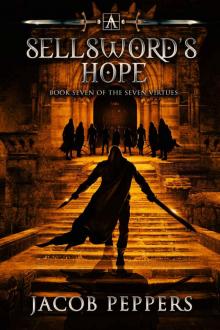 A Sellsword's Hope
A Sellsword's Hope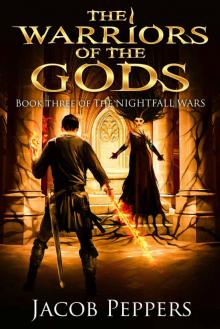 The Warriors of the Gods
The Warriors of the Gods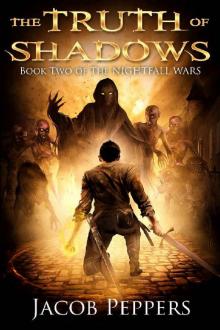 The Truth of Shadows
The Truth of Shadows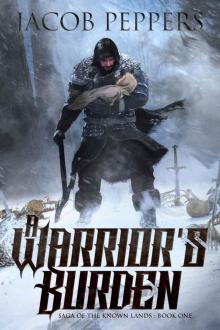 A Warrior's Burden: Book One of Saga of the Known Lands
A Warrior's Burden: Book One of Saga of the Known Lands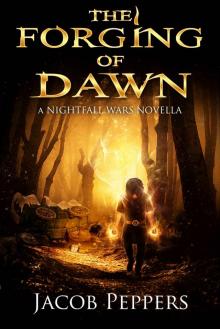 The Forging of Dawn
The Forging of Dawn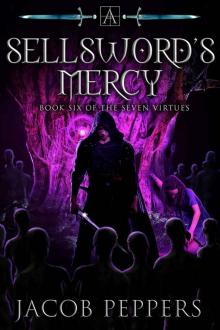 A Sellsword's Mercy
A Sellsword's Mercy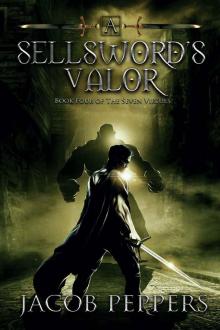 A Sellsword's Valor
A Sellsword's Valor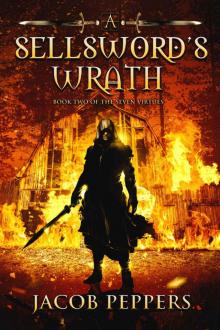 A Sellsword's Wrath
A Sellsword's Wrath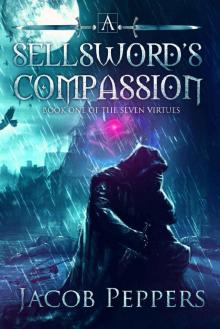 A Sellsword's Compassion_Book One of the Seven Virtues
A Sellsword's Compassion_Book One of the Seven Virtues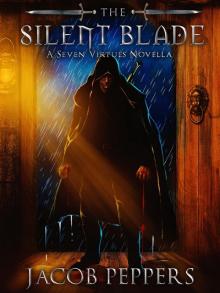 The Silent Blade: A Seven Virtues Novella
The Silent Blade: A Seven Virtues Novella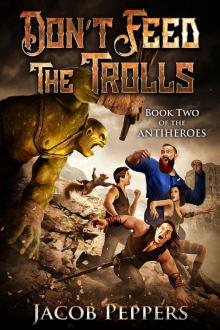 Don't Feed the Trolls
Don't Feed the Trolls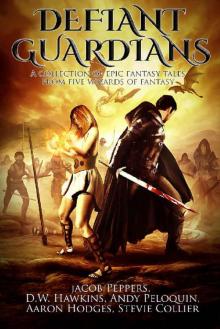 Defiant Guardians Anthology
Defiant Guardians Anthology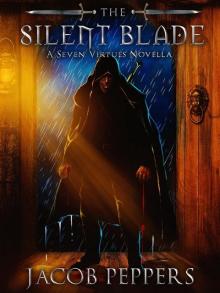 The Silent Blade
The Silent Blade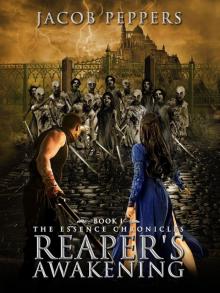 Reaper's Awakening
Reaper's Awakening